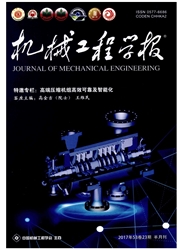

 中文摘要:
中文摘要:
插电式混合动力客车(Plug-in hybrid electric bus,PHEB)因其低能耗、低排放等特性,成为公交客车领域的研究热点。然而在应对复杂瞬变的城市公交工况时,如何设计实时高效的能量管理策略、实现PHEB全工况能耗最优仍然是当前亟待解决的难题。针对该问题,提出一种基于粒子群算法(Particle swarm optimization,PSO)优化的等效燃油消耗最小策略(Equivalent consumption minimization strategy,ECMS),建立基于等效因子优化的ECMS能量管理策略;考虑到汽车低速发动机频繁起动问题,引入发动机起动车速限制,并利用PSO离线优化特定工况下的等效因子和发动机起动车速,从而获得可在线应用的插电式混合动力客车实时控制策略。基于Matlab/Simulink软件,搭建整车仿真模型,并对所提出的方法进行仿真和硬件在环试验验证。结果表明,所研究策略可实现不同初始SOC条件下的PHEB能量管理策略的近似全局优化,与规则式能量管理策略相比,燃油经济性提升了8.5%。
 英文摘要:
英文摘要:
Plug-in hybrid electric bus (PHEB) has become a hot spot for bus research due to its lower energy consumption and lower emissions, etc. For the complicated and transient driving conditions of city bus, how to minimize the energy consumption of the whole driving cycle by designing the real-time energy management strategy for PHEB is still a problem in the recent years. To solve this problem, an equivalent consumption minimization strategy (ECMS) based on particle swarm optimization (PSO) is proposed. The energy management strategy based on the optimization equivalent factor is proposed. Considering the engine frequently start-up problems at lower vehicle speed, the speed limits for engine start is introduced, and the equivalent factor and the speed of engine start of certain condition is offline optimized by PSO to obtain the PHEB application online real-time strategy. The simulation model of the vehicle is built by Matlab/Simulink. The presented method is verified by simulation and hardware in the loop (HIL) experiments. The results show that, the research strategy could achieve global optimization PHEB approximate energy management strategies under different initial SOCk, the vehicle fuel economy increases by 8.5% comparing with the rule-based strategy.
 同期刊论文项目
同期刊论文项目
 同项目期刊论文
同项目期刊论文
 期刊信息
期刊信息
